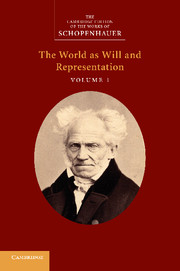Book contents
General editor's preface
Published online by Cambridge University Press: 06 December 2010
Summary
Schopenhauer is one of the great original writers of the nineteenth century, and a unique voice in the history of thought. His central concept of the will leads him to regard human beings as striving irrationally and suffering in a world that has no purpose, a condition redeemed by the elevation of aesthetic consciousness and finally overcome by the will's self-denial and a mystical vision of the self as one with the world as a whole. He is in some ways the most progressive post-Kantian, an atheist with profound ideas about the human essence and the meaning of existence which point forward to Nietzsche, Freud and existentialism. He was also the first major Western thinker to seek a synthesis with Eastern thought. Yet at the same time he undertakes an ambitious global metaphysics of a conservative, more or less pre-Kantian kind, and is driven by a Platonic vision of escape from empirical reality into a realm of higher knowledge.
Schopenhauer was born in 1788, and by 1809 had gone against his family's expectations of a career as a merchant and embarked on a university career. He completed his doctoral dissertation On the Fourfold Root of the Principle of Sufficient Reason in 1813, then spent several years in intensive preparation of what became the major work of his life, The World as Will and Representation, which was published at the end of 1818, with 1819 on the title page.
- Type
- Chapter
- Information
- Schopenhauer: 'The World as Will and Representation' , pp. vii - ixPublisher: Cambridge University PressPrint publication year: 2010

